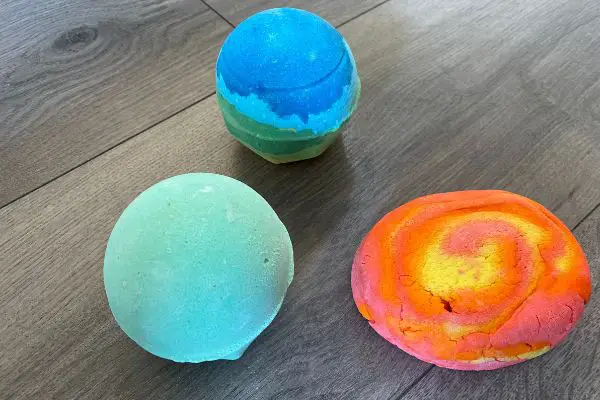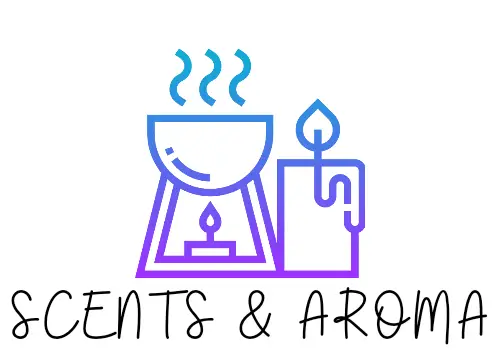Bath bombs are considered safe and non-toxic for adults. However, you could still get reactions like skin irritation, redness, rashes, and itching, from using them. This is because they contain artificial additives that may not be too friendly to the skin, especially for sensitive skin. So while most bath bombs are safe, you must be careful if your skin is sensitive.
In this article, we will be answering the following questions:
- Are bath bombs safe to use?
- Are Lush bath bombs safe and non-toxic?
- What are the potential allergic reactions to essential oils in bath bombs?
- What safety tips should I follow when using bath bombs.

Are bath bombs safe to Use?
Yes, most bath bombs are safe to use. The whole idea of soaking in scented and colored bath water is great and lovely. However, it’s best to go for the more natural ones. Dyes, fragrances, and glitters, although considered not to pose any significant health risk, might cause reactions on sensitive skin. So if you know that you react to any of these, ensure you check the ingredient lists so you won’t get bath bombs with the wrong ingredient.
Try where possible to use organic and non synthetic bath bombs such as these on Amazon as this will reduce your risks from having a reaction.
If possible, go for products that don’t use so much of these, and if you must go for them, use trusted brands. Here are some components that can be found in some bath bombs which you may react to:
- Fragrance: Bath Bombs contain varieties of fragrances, some of which may be artificial. Fragrances are a significant concern for skin care users because companies are not mandated to list their fragrances.
- Dyes: Bath bombs are usually infused with food dyes to make them appear colorful. However, some people may react to the dyes released from these balls. Dyes could also irritate the genital area since you will be soaking in the water containing the dyes. Some food dyes are not considered safe so check to see the type of dye used in a bath bomb before making a purchase.
- Talc: The safety of talc has often been questioned as it could be toxic if contaminated by asbestos, a known carcinogen. While talc has not been ruled unsafe, it is unsafe to inhale. If possible, avoid buying bath bombs containing talc.
- Additives: Other additives, like glitters, could cause abrasion to the skin. Glitters are an aesthetic part of the bath bomb. Most of them are made from plastic and artificial materials; thus, they can irritate the skin.
If you are sensitive to the materials used in a bath bomb, you should avoid them or find a suitable one. However, those people who aren’t allergic to these ingredients can use bath bombs safely.
Another important point when it comes to bath bath safety is to make sure that you do not use one that that has expired. In general bath bombs expire after around 6 months if they contain natural ingredients such as essential oils
Are Lush Bath Bombs Safe and Non-Toxic?
Yes, Lush Bath bombs are safe and non-toxic. Lush cosmetics invented bath bombs in 1989. Currently, they use primarily organic materials in the production of their bath bombs. Their synthetic ingredients are listed as safe synthetics. So though, Lush bath bombs are not entirely organic, they contain primarily natural biodegradable ingredients and preservatives that are not harmful or toxic.
Some ingredients in Lush bath bombs are baking soda, citric acid, perfume, color, safe synthetics, synthetic mica for glitters to replace the natural mica (this is much safe than synthetic glitters), essential oils, and corn starch.
Compared to other bath bombs, lush uses safer ingredients with consideration for those with sensitive skins. They leave out the not too safe ones like Sodium Laureth Sulfate (SLS), Sodium Ether Lauryl Sulfate (SLES), talc, synthetic glitters, and harmful food dyes.
The only issue with Lush bath bombs is they are very expensive but they are great for the occasional treat.
What are the Potential Allergic Reactions to Essential Oils in Bath Bombs?
For people with sensitive skin, essential oils in bath bombs may cause itching, redness, hives, etc. Also some people may find that certain essential oils can cause nausea.
Some asthmatics patients and those with respiratory difficulty may react to these essential oils so they should be careful when choosing bath bombs. It’s best to use bath bombs with mild essential oils that have been adequately diluted.
As a safety rule, go for trusted brands that use quality essential oils. Also, know the essential oils you are naturally allergic to and avoid using bath bombs that contain them. If you get irritations while using bath bombs and you suspect it’s the essential oil, consult with your doctor.
Are bath bombs safe during pregnancy?
You can never be too careful during pregnancy, especially early, as the slightest mistake may result in serious problems. Making a little human can be a very complicated and delicate task. Taking care of yourself and the little one inside you should be of utmost priority, and soaking yourself in a refreshing bathtub may be the right thing you need to ease off at the moment.
Bath bombs are not harmful to pregnancy, only when used incorrectly. There are specific essential oils that you should avoid when pregnant, as these oils can start contractions which is not something you’d want to happen before your pregnancy is due. The first thing you want to do before getting a bath bomb is to check the ingredient list to see if the essential oils used are suitable for pregnant women.
Examples of such oils are: Cinnamon, Juniper berry, thyme, mustard, basil, nutmeg, clary sage, clove, and bitter almond. Any of these ingredients should be avoided.
There are safer ingredients to choose from, and as long as you choose from those, you and your baby will be safe and relaxed. Also, conduct a doctor before using any skin care product you are unsure about. Remember to always spend as little time in the bath as possible; 10 – 15 minutes is adequate bath time.
If you would like to know if bath bombs are safe for kids have a read of this guide that I wrote.
What are the Safety Tips to Follow When Using Bath Bombs?
- Before using any bath bomb product, it is vital to check the list of ingredients. Ingredients that may cause an allergy or irritation to your skin should be avoided entirely.
- Don’t use bath bombs if you have an open cut or injury.
- Avoid using bath bombs every day. It’s more appropriate to use them three to four times a week.
- Do a patch test by rubbing the bath bomb on your inner elbow to check for any reaction before using it.
- It is also advisable not to spend a long time soaking in the bathtub. It would be best if you rinsed off with water when you are out of the bathtub.
CONCLUSION
Bath bombs are skin care products used during bathing to pamper the skin. Adding bath bombs to bath water provides benefits such as hydration and detoxification of the skin as relaxation after a stressful day. Bath bombs with mostly natural ingredients are safe to use, except if you are allergic to the components of the product. If you have irritations, ensure you see a doctor and discontinue use.
- Can You Put Perfume In A Humidifier? (Read First) - September 17, 2022
- Can You Put Essential Oil In A Steam Mop? (Safety Advice) - September 17, 2022
- How To Make Lavender Oil At Home ( Candles And Diffusers) - September 9, 2022
